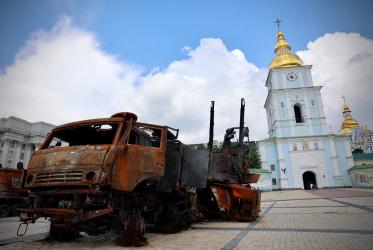Drawing on the Indian churches’ experience of Christian disunity in the realities of casteism, churches around the world are celebrating the Week of Prayer for Christian Unity with a particular focus on justice as integral to the unity they seek.
Developed by an ecumenical group gathered by the Student Christian Movement (SCM) in India, the preparatory resources for this year’s week of prayer focus on the theme, “What does God require of us?” (Micah 6:6-8).
The week of prayer is traditionally celebrated from 18 to 25 January (in the northern hemisphere) or at Pentecost (in the southern hemisphere).
Since 1968, the liturgical and biblical material for the annual week of prayer has been jointly published by the WCC’s Faith and Order Commission and by the Pontifical Council for Promoting Christian Unity of the Roman Catholic Church.
“The search for visible unity cannot be disassociated from the dismantling of casteism and the lifting up of contributions to unity by the poorest of the poor,” states the introductory text for the Week of Prayer for Christian Unity 2013.
“The theme of this year's Week of Prayer for Christian Unity challenges us to rethink Christian discipleship in terms of 'being shaped by God's presence with' and 'as following God's engagement in' the most unexpected agents and aspects of human life,” said the Rev. Dr Peniel Rajkumar from India, a newly appointed WCC programme executive for inter-religious dialogue and cooperation.
Before coming to the WCC, Rajkumar had helped draft preparatory resources for the week of prayer.
“The theme has the potential to draw together churches to celebrate Christian unity in a manner which extends the idea of Christian unity to embrace the idea of God's radical hospitality, and thereby redefine it along the lines of justice, kindness and humility into prophetic solidarity,” he added.
“The theme 'what does God require of us' challenges us as Christians and churches across the world to follow the 'God of life', into the paths of justice and peace by committing ourselves to the cause of justice, while communicating kindness and cultivating humility,” said Rajkumar.
Global celebrations for the week of prayer
Canon John Gibaut, director of the WCC’s Commission on Faith and Order, preached at the Week of Prayer for Christian Unity celebration at the Ecumenical Centre in Geneva, Switzerland, on 21 January.
He said that through the preparatory resource young people of the SCM in India “named where Christian disunity hurts the most in India today: casteism. Casteism is an issue that divides Indian churches from each other, but also Christians within churches.”
The students from India, said Gibaut, have named “casteism not only as a theological issue, but as an ecclesiological one. For within the Christian community it contradicts the biblical vision of what it means to be Church, and oneness with one another in Christ that Paul proclaims to the Galatians.”
Churches together in Britain and Ireland celebrate this year’s Week of Prayer for Christian Unity considering the theme a call for churches to “respond to the obligations to act justly in the world”. Partnering with the charity Christian Aid, they put the theme in relation to Christian Aid’s global work on poverty and advocacy for justice.
The Micah text which provides the overarching theme for the Week of Prayer for Christian Unity was also taken up by the European Evangelical Alliance in the material for their week of prayer “Walking with God in humility and joy” (13 to 20 January). This led to many evangelical churches in Europe developing their own meditations, selection of Bible texts, services and prayers.
In some countries such as the Netherlands, for a number of years the two weeks of prayer have been taken up as a thematic whole by the churches. This provides a focus for prayers for unity at the beginning of each year for Christians from churches of diverse backgrounds. This year’s theme of walking humbly with God and responding to the call to justice was also welcomed by churches and Christians engaged in the worldwide Micah Challenge.
Another example, from South America, are the celebrations for the week of prayer held by the Evangelical Youth Network together with various local churches. The special service at the Catholic Church of San Antonio de Padua in Lima will involve the Peruvian Episcopal Conference, the National Evangelical Council of Peru, the Union of Evangelical Christian Churches of Peru, the Peruvian Bible Society, and the Young Men’s Christian Association and other Christian organizations. The service will acknowledge youth and their efforts for Christian unity in Peru.
Churches in Jerusalem also are holding ecumenical celebrations throughout the week of prayer. One such service was at the Anglican Cathedral of St George the Martyr in Jerusalem. The service titled “Walking in Conversation” was based on the road to Emmaus story from Luke 24. The Anglican Bishop Suheil Dawani led the prayers.
More information on the Week of Prayer for Christian Unity
WCC Commission on Faith and Order








